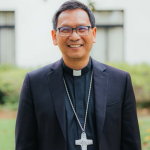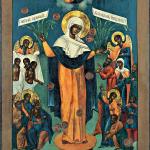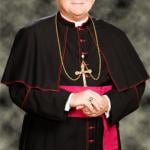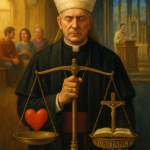Last updated on: January 12, 2017 at 5:25 pm
By
CNA Daily News
Rome, Italy, Jan 12, 2017 / 10:25 am (CNA/EWTN News).- After former Grand Chancellor of the Knights of Malta Albrecht Freiherr von Boeselager was dismissed in early December, many have pinpointed the decision to a contraception scandal related to a project he was overseeing. But a senior official of the Order has said that while the incident was a contributing factor in Boeselager’s resignation, the reasons – while confidential – are much broader. “The reasons for the dismissal are confidential,” but they are “more complex” than reducing it to just the contraception incident, Eugenio Ajroldi di Robbiate, Communications Director for the Knights of Malta, told CNA Jan. 12. Problems initially arose when it was learned that the Order's charity branch, under Boeselager’s watch, had inadvertently been involved in distributing condoms in Burma to prevent HIV. However, Robbiate said Boeselager wasn’t initially aware that condoms were being distributed as part of the project, and when he found out “he immediately stopped all the programs.” So while the incident was indeed a factor in why the Grand Chancellor was asked to resign, Robbiate stressed that issue is “poorly reported” by many news agencies, since the full picture, while remaining confidential, is “much more complex than just the point on contraception.” Robbiate also confirmed that while Boeselager had been asked to resign, his refusal twice to comply with the request is what actually led to his eventual dismissal, since by refusing he broke the vow of obedience he had made as a Second Class member of the Order. The Knights' Dec. 13 statement regarding the dismissal also noted that Boeselager's “subsequent concealment … from the Grand Magistry” of “severe problems which occurred during [his] tenure as Grand Hospitaller of the Order of Malta” was a factor in the decision. The confirmation comes alongside the latest round of a row between the Vatican and the Knights of Malta over Boeselager’s resignation, with the Knights saying they will not cooperate in a Vatican probe over the former Grand Chancellor’s forced removal due to “legal reasons.” In a Jan. 10 statement, the Knights of Malta reiterated that the decision to dismiss Boeselager was “an internal act of governance,” and because of this the group established by the Holy See to investigate the decision is “legally irrelevant.” The Vatican had formed a group of five senior officials shortly after the forced resignation to investigate the matter. Members of the group include Archbishop Silvestro Tomasi, Fr. Gianfranco Ghirlanda S.J., Belgian lawyer Jacques de Liedekerke, Marc Odendall, and Marwan Sehnaoui. “Considering the legal irrelevance of this group and of its findings relating to the legal structure of the Order of Malta, the Order has decided that it should not cooperate with it,” the statement read, insisting that this refusal is to protect the Order’s sovereignty against “initiatives which claim to be directed at objectively (and, therefore – quite apart from its intentions – reveals it to be legally irrelevant) questioning or even limiting said Sovereignty.” The Knights also urged members to be uncooperative, saying any depositions individual members might give to the Vatican’s investigative group “cannot, in their terms and judgments, be in contradiction, directly or indirectly,” with the decision to remove Boeselager from his position. Robbiate also laid to rest rumors that the Knights’ refusal to cooperate with the Vatican is somehow rooted in tensions between Pope Francis and Cardinal Raymond Burke, Patron of the Order and one of four signatories of a letter asking the Pope to clarify five “dubia” regarding his apostolic exhortation Amoris laetitia. Robbiate explained that since the Order functions more like a State that has diplomatic relations with the Holy See, Cardinal Burke, who serves as a quasi-ambassador, “is not involved” in decisions made by their hierarchy. “How would he be involved?” Robbiate asked, explaining that “like any other ambassador, the cardinal has no voice” on the internal decisions of their leaders. So opting not to cooperate in the Vatican investigation “has nothing to do” with Cardinal Burke, but was rather a decision made by the Grand Magistry without the cardinal’s input. In their latest statement, the Order spelled out the reasons why, according to their constitutions, they are able to refuse cooperation with the Vatican’s investigative group on legal grounds. Citing Article 4 of their Constitutional Charter, the Knights said the religious nature of the Order “does not prejudice the exercise of sovereign prerogatives pertaining to the Order” since it is it is “recognized by States as a subject of international law.” They stressed the fact that the Order has diplomatic representation to the Holy See which abides by the norms of international law, rather than having the relationship of a typical religious order. This is backed up by the Holy See’s Annuario Pontificio, the “Pontifical Yearbook” which lists the information for all dioceses and Vatican departments, and where the Order of Malta is listed “only once and not amongst the religious orders, but rather amongst the States with Embassies accredited the Holy See,” the Order’s statement read. In regards to Boeselager’s act of disobedience when asked to resign, the Knights noted that according to their Constitutional Charter, Second Class members who have made a promise of obedience “are only subordinate to their particular religious superiors within the Order.” Because of this, the Order said that, strictly in a legal context, a refusal to a command given in obedience “does not justify in any way the involvement of ‘religious superiors,’ all the more so as they do not all belong to the Order.” Not only is the involvement of superiors who don’t belong to the Order “legally impossible,” it is also “superfluous in terms of protecting members of the Order,” the Knights’ statement read, noting that should members want to appeal a decision they feel is too harsh, they can do so in the Order’s Magisterial Courts. The decision not to cooperate with the Vatican’s investigative group, then, has “strictly legal grounds,” and therefore it “cannot in any way be considered as a lack of respect” toward the Holy See or the group carrying out the investigation. Read more















